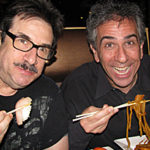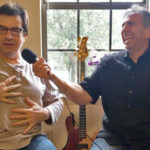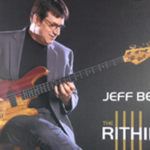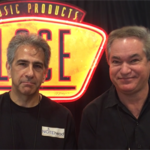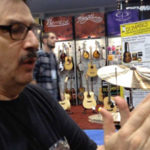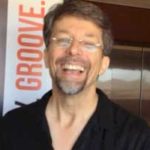Bass icon recounts the journey from his days as a classical violinist to becoming one of the most highly regarded electric bass players in the world!
Exclusive interview with FBPO’s Jon Liebman
June 21, 2010
Jeff Berlin is considered by many to be the finest electric bass player in the world. A true master of the bass, Jeff has played with the likes of Bill Bruford, George Benson and Allan Holdsworth and has toured with the original members of Yes. He has also toured with BX3, a conglomeration with fellow bassists Stuart Hamm and Billy Sheehan. Jeff’s playing has been lauded by bass greats no less than Jaco Pastorius, Geddy Lee and Marcus Miller.
Jeff is the founder of The Players School of Music in Clearwater, Florida, and has also been at the forefront of music education for almost 30 years. His columns in Guitar Player and Bass Player magazines were wildly popular and often controversial.
Jeff’s numerous recording credits include seven highly acclaimed solo records: Champion, Pump It!, Taking Notes, In Harmony’s Way, Lumpy Jazz, Aneurythms and the just-released High Standards, recorded with pianist Richard Drexler and drummer Danny Gottlieb.
FBPO: Let’s start from the beginning. Tell me about your musical upbringing and how you ended up as a bass player.
JB: From pretty much the first months of my life, I heard classical music because my father played it all the time. He was an opera singer and, when I was a kid, I would imitate some of the Italian lieder, phonetically singing them when I was about a year old. So, they decided I had a good musical ear and, when I turned five, my parents gave me violin lessons. It wasn’t the music I would have chosen, but you will never meet a person more grateful than me for having experienced ten years of classical training. It changed my life to this moment that we’re talking. It prepared me to think way more broadly than I might have thought had I not been trained in classical music. So, those were my roots. I was a conservatory-trained violinist. I played recitals, I played in orchestras and I’m a well-schooled, well-trained classical student, thank goodness.
FBPO: So how did you make the transition from violin ultimately to the bass?
JB: I would say for the same reasons that everybody else of my age did. We all saw the Beatles on Ed Sullivan. I had never heard of the Beatles until my neighbor across the street told me about the show. They were on that night and they had already generated a buzz. So I watched them and I wasn’t particularly impressed with the band because they didn’t do what I did and, being a young kid and a classical snob, I wouldn’t have any interest in participating in or doing their music, but it wasn’t long before they crept right into the marrow of my bones.
When I was a kid, I used to take violin lessons in the summertime in Rockville Center, New York, at a conservatory that’s now closed. My teacher would drive me home – I must have been 9 years old – and because I was studying in the summer, she would buy me an ice cream as a reward and we would hear Elvis and Little Richard coming from the radio at the ice cream place. We would look at each other as if to say, “This is horrible music!” I was only 9 years old, but already I was a classical snob. And then when the Beatles came on, I didn’t get it until a little while later. After a while, I not only got it, but it changed me totally, from the inside out.
FBPO: You must have come a long way, from basically thumbing your nose at the Beatles until eventually finding them in the marrow of your bones. Was that a gradual thing or did something just click one day?
JB: I believe something just clicked one day because I became a committed fan. And suddenly I heard these guitar sounds and these vocals and the whole presentation of these guys got to me deeply, profoundly and permanently. I still regard them as the greatest rock band of all time. I don’t think anybody would dispute that. They are the greatest band that ever got together at any time.
FBPO: Most people would agree with that statement.
JB: Yeah! Well, they changed everything, they did everything. There wasn’t anything they didn’t affect, to this moment. So, they were the Bruce Lee of music. I got so enamored with the Beatles that I finally gave up the violin at age 16. I bought my first bass guitar when I was 14 years old with money that I saved from my newspaper route.
FBPO: After all those years on the violin, it might have been a logical transition for you to play the upright bass, with the bow and that whole thing.
JB: It seems that way, except that I had so tired of the classical structure and discipline of learning how to play. I spent years playing an instrument that took years just to make a sound out of it! I mean that’s a lot of dedication and it can really wear you out. I didn’t want to go that way on the upright bass. I wanted immediacy. I wanted the moment – the nanosecond – that I touched a bass guitar string to hear and feel that bass note coming back at me. You can’t get that with an upright.
FBPO: Did you ever play an upright?
JB: No. I’ve dabbled on it. I’m a faker of the third kind!
FBPO: Was there a turning point, some defining moment, that made you realize you were actually, for real, going to make your living as a professional musician?
JB: In my teens, I started to do local gigs around the area, nothing special, just parties. I had a rock band and we would play. I began to love the experience of playing a bass guitar and hearing other guys play their instruments along with me, and I with them. I was convinced that this is so necessary to my fiber, deep in the fiber of me as a human being, that I had to pursue it and I knew this was my life’s calling. And I’m grateful because a lot of people spent many years not knowing exactly what they were going to do and I would say from the time I was 15, I knew exactly what I was going to do.
FBPO: And what was that?
JB: To be a musician. To be a bass player. There was nothing else that caught my interest. I remember in high school, people would say we’re going to go to this college and we’re going to study law maybe or medicine or go into accounting and all the varieties of available professions for people. None of it meant anything to me. I was actually a little concerned because I was never academically motivated in high school and I couldn’t bear the thought of going to college to learn how to study and acquire skills in a profession that meant nothing to me.
FBPO: Did you ever go school after high school?
JB: I went to Berklee College of Music and I was changed forever from the lessons and the people that I met up there. I mean in the time I was up there, I would hang and play and study with or from Gary Burton, Pat Metheny, Mike Stern, Bill Frisell, John Scofield, Vinnie Colaiuta, Steve Smith, Larry Coryell…
FBPO: These guys were your classmates, or they were your teachers?
JB: They were classmates and they were guys in the area and they were people that I played with. My general jamming day would include sessions with Pat Metheny and then later I’d play with Stern and then later I’d play with Frisell. I studied with Mick Goodrick a little bit and Gary Burton was there, as I mentioned. I was literally in the jazz royalty situation that only occurred, historically, as far as I know, one other time.
Now imagine this. In the early ’70s down in Miami, Pat Metheny was there at that time, Steve Morse was there, Jaco Pastorius was there, Mark Egan was there, Danny Gottlieb was there, Bruce Hornsby was there, Gil Goldstein was there. It was an enclave of some of the future greats around the Miami area.
FBPO: Don’t forget Will Lee!
JB: Will Lee was down there, too. And at exactly the precise same moment that those future superstars were commingling in anonymity and learning how to play with and from each other, I was smack-dab in the middle of the same thing happening in Boston!
JB: I greatly appreciate and love rock music. The heavier, the better. It’s fun, it’s exciting, it’s emotional and I, frankly, feel that a lot of the rockers are more legitimately passionate about their art form than some of the jazzers. I guess what I’m trying to say is that the heavy rockers seem to be non-compromising in their love for their music, where some of the jazzers will sort of soften it up in order to succeed commercially.FBPO: You’ve always struck me as more of a jazz guy, but you seem to have a real appreciation for rock & roll, too, especially given your love of the Beatles plus the stuff you’ve done with Bill Bruford and Yes, for example.
FBPO: Well, maybe rock is more of a lifestyle and a culture than jazz is.
JB: Well, it used to be before Nike and Burger started using rock music in their commercials. Rock is now a commercial music. It used to be that dangerous music, you follow? Originally, it was called “race music” because white people were terrified of rock & roll because they thought it sounded black. And then the white kids started to play it. It started off as a rebellion, a music that actually threatened the fiber of society.
FBPO: You can go back a couple decades and say that about jazz also, can’t you?
JB: Jazz was a music that was, in a sense, the entertainment element. Glenn Miller, the big bands of the ’40s, the bebop of the ’50s. These guys were on TV and these were the guys that were lauded for their playing genius. For the simple fact that they could play, they were stars in their own right. So, dangerous, I’m not sure. I think that jazz was almost a little bit of an enigma to people who did not really latch onto the meaning of it. It certainly was exposed, but it rarely, if ever, sold a million copies. Elvis, on the other hand, instantly did and all those artists sold millions. That’s what threatened the fiber of society in those days when these white kids started to dance around to this music and listen to what was considered race music.
So, rock was a dangerous art form. The Beatles came along. They weren’t dangerous. They were nice, clean-cut young men. The Rolling Stones were more dangerous because they weren’t nice and clean-cut [laughs]. Thank God for the Beatles’ sort of attractive appearances because they snuck through. Their genius is what sustained them, but it was really that cute thing they had going — the handsome Paul and the witty John, you know what I mean? They weren’t so-called dangerous, but they still changed everything. Today, you want to buy a hamburger? Rock music. Today, you want to buy sneakers? Rock music. Music is a cliché in many cases today. That’s what happens when you make millions off a musical style. The commercial world will find out about it and try to make that million for themselves, too. There’s really nothing wrong with it. That’s what makes America work.
FBPO: Speaking of rock & roll, what exactly is the story with you and Van Halen?
JB: Eddie Van Halen is a very nice guy. He introduced himself to me at a Bill Bruford concert that we were playing back in the late ’70s or early ’80s. He was a very polite, very nice young guy, but I didn’t know him because I wasn’t in that circle. And I asked him, quite innocently, “Are you a musician? What do you play?” And he looked like he was slapped. Later, I met him and he told me that Bill Bruford had sort of made a snide remark to him like, “Mr. Platinum” or “Mr. Rock Star,” or something like that. Then he thought my not recognizing him was a follow-up and a snub, which I never would have done because why would I snub anybody I didn’t know? It’s just not me.
But, I saw where he was coming from so I apologized to him and we became friends. I said I had no idea who you were. Forgive me. It wasn’t a musical situation I was aware of. And we became very good friends. We used to hang. We played and, actually, we wrote a little music together and then he asked me to join the band. We jammed and I don’t think Dave [David Lee Roth] wanted me in the band. I didn’t look “rock” enough and I think he preferred Billy Sheehan anyway. But I basically had to say no because the band required a full, spiritual dedication and I think we had different vision about things. So instead of just being mercenary and taking the money, I thought it would be better, for them, that I don’t fake my way into the group, so I just said no.
FBPO: Tell me about your approach to music education. It’s been said you’ve got your own ideas about how to learn that are often contrary to some of the traditional teaching methods involving things like electronic tuners, metronomes, tablature, etc.
JB: Well, it’s actually the other way around. These guys have their particular methods that go contrary to the established methods that I know work. I offer methods that work in all situations of education. When you learn a language, for example, you have to learn it slowly. You don’t learn a language in conversational time; you learn a language slowly. When you learn to be an electrician, you have to learn things slowly, out of time. This is this wire and this is this screw and this is this conductor and this is this cable. These things in education are always taught out of time so that you have the time to gather information.
Where other people have gone wrong is that without understanding or having experience in what makes a musician a musician, they have taken occasional gimmicks, shortcuts and misguided information and made them popular nationwide. People talk about practicing with a metronome. A metronome is a device that insists that you play in time according to its beat, which means that you have to perform. You put a click on and you must keep up with the click. My question is, if I am learning something, why should I play it in metronomic time? I’m supposed to be learning. I’m supposed to be gathering information. I’m supposed to be practicing. I am not supposed to be performing.
FBPO: But, eventually, there’s a place for a metronome in practice, isn’t there?
JB: Well, I guess my answer would be this. Can you tell me any music that you are aware of where a metronomic time is part of the performance of that music?
FBPO: Well, what if you’re just practicing grooving and you want to make sure that you groove in time and with a great time feel and that you’re not rushing or dragging?
JB: Well, if you’re using it as a drum machine, I mean people do this. What I object to is the idea that people believe that they’re going to get good time by using a metronome because they won’t. If you pop a click on and you want to jam along with it, that’s fine. I’ve done that. I’ll pop a click on, put it on two and four and I’ll play jazz solos over it. But people rely on the click in order to establish their good time sense. If you don’t have a drummer, pop a click on, but that’s not where time comes from. You are merely using, let’s say, a rhythm section partner in the metronome, who isn’t listening to you and has no interest whatsoever in compromising its click beat. You are utterly relying upon “him,” the metronome, and you have to adjust to it. That’s not what groove is. Groove is a mutual understanding of where a quarter note goes and an agreed-upon performance on each of our instruments in synchronization.
Go back to all of the sessions by Motown, which I don’t think were ever played with a click. Go to every big band performance in history. They were never played with a click. Go to every, let’s say, ’50s, ’60s, ’70s, even many of the popular rock bands until recently, some of the greatest anthems in rock performances. They weren’t played with a click. I know the Who did that sequence thing, so they used it as part of the song. Interestingly, some people commented that Keith Moon sounded pretty bad on some of that sequenced music. Isn’t that interesting? Because his groove was confined by a click. Music is not click-oriented. Learning is not click-oriented. It is an unrealistic intrusion upon a performance or upon the learning situation that a musician participates in. But if you jam along with it, so you jam along with it.
FBPO: I guess this would be as good a time as any to ask you about the whole TalkBass situation. What happened?
JB: I don’t really have too much to say about that whole incident. I was hosting a forum where I would offer suggestions to people about how to learn to play the bass. I’ve always been pretty outspoken about what I think about most of the teaching methods used in music these days and I guess that rubs some people the wrong way. So, some of the comments people wrote were a little mean-spirited and I ended up getting into it with the TalkBass moderators, who didn’t like the way I responded to those comments. Looking back on it, I guess I’d have to say there was wrongdoing on both sides. I’d just like to put the whole thing behind me and move on.
FBPO: Tell me about the Players School of Music. Give me an overview of what the school is all about.
JB: It is an opportunity for musicians to learn music on their instruments. We take beginners, people who have never read one note. Imagine this, Jon, in ten weeks, they’re soloing, they’re reading chords, they’re reading melodies.
FBPO: What magical thing happens in that time period?
JB: They don’t get too much music to study. We give it to them in doses. It’s like taking a bowl of soup. It’s consumed one spoonful at a time. The same approach needs to be taken in learning music. The magic comes because I don’t care if people make mistakes, I don’t care if people lose their spot, I don’t care if people lose the time. None of this matters because they’re supposed to make mistakes and lose their place in the music to get what note is what. It’s part of the whole learning process because they have permission from me to do that. They have permission to learn the music a little more slowly and therefore learn it correctly. Without a doubt, a hundred percent of these guys get better as players, without fail, as long as they do the work.
FBPO: I love your new CD, High Standards. It’s a bit of a departure from what I’m used to hearing on your other CDs. What made you decide to record an album of standards?
JB: Well, I’ve always played standards, Jon. I grew up with standards. When I went to Berklee in 1972, I think the very first standard I ever played was “On A Clear Day, You Can See Forever.” And it was actually, I think, in an ensemble with Gary Burton. I believe that was the very first jazz standard I ever played. From that point on, I played many of them, as many guys of that era had done.
I’ve been listening very closely to Keith Jarrett the last couple of years. He’s principally the most important musician in my life at this moment. I’ve transcribed his solos and I’ve listened closely to him. I fall asleep every single night listening to Keith Jarrett and I have gotten deeply into his playing from doing that. I wanted to do another record and I thought why not do standards and do it a la Keith? I know I’ll never approach the genius this guy constantly demonstrates as a player, but I thought there aren’t any bass players that really did what I would call a successful standards record, not on electric bass. And I thought maybe I could break new ground and show that this is a good instrument in a jazz setting. So, I got my two long-time buddies, Danny Gottlieb and Richard Drexler, and we recorded it. I would say that the bass solos on that CD are the best I’ve ever done. I wanted to demonstrate a live, instantaneous relationship. We barely rehearsed. We barely even discussed the music, except for the Ravel piece, which I wrote out.
FBPO: You’ve accomplished so much in your career already. What else would you like to do that you haven’t done yet?
JB: Well, Herbie Hancock and I, in passing, are chatting about possibly hooking up sometime. There are different people that I would very much like to play with and while I’m waiting to see if this will come to pass, I’m continuing doing my thing. I jokingly say that because I’m a bass player, not many people really pay much attention to what I do. And my new CD, it’ll probably sell dozens!
There’s a very wonderful legendary guitar player named James Burton, who played with Elvis Presley. James, interestingly, heard me play jazz and became the only visionary outside of jazz to understand that I would be an interesting colleague to use with country or rock music. Nobody else got that message and it amazed me that a guy who’s such a legendary guitarist who’s into that finger picking “countrified” type of playing even noticed a guy like me. He got me a session with Jerry Lee Lewis and I played with him in Shreveport, Louisiana, a couple of years ago. We did a show that he sponsored.
That’s the thing that would interest me. To see if there are people who are not only jazz guys, but non-jazzers, who might find something slightly revolutionary by using a guy like me in different contexts other than the pure, traditional role of a bass guitar. So, I solicit people, I talk to people and I get what I call “the blank look.” It’s still a dinosaur instrument, buddy. Don’t think that it isn’t. We’re still in the back of the bus. It’s not really an equal opportunity instrument in many ways. We certainly can lead groups with them and we certainly can get in certain rock bands and become equal, but outside of those two self-organized opportunities, nobody cares about bass players, except in the most traditional thought-out roles. I’m okay with that, but jeez, have a little bit of vision. Maybe there’s something else that can happen, as well.
FBPO: What do you like to do when you’re not immersed in music?
JB: I’m home with my kids. Actually, I bought a smoker the other day, so I’m learning about barbecue. A couple of guys are helping me out because I’m as green as you can get. I go the gym. I like boxing. I’m a reader, so I enjoy that. I like practicing or learning about cooking, trying to learn a few recipes. That’s it. I’m pretty much a domestic at heart. I stay home. I watch House.

